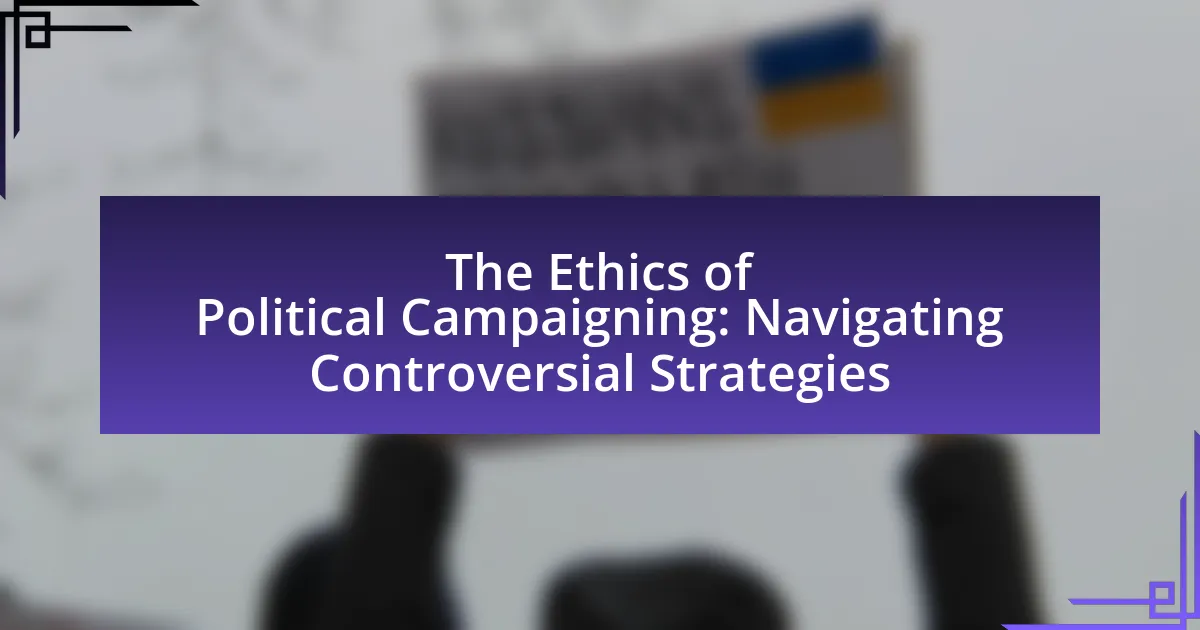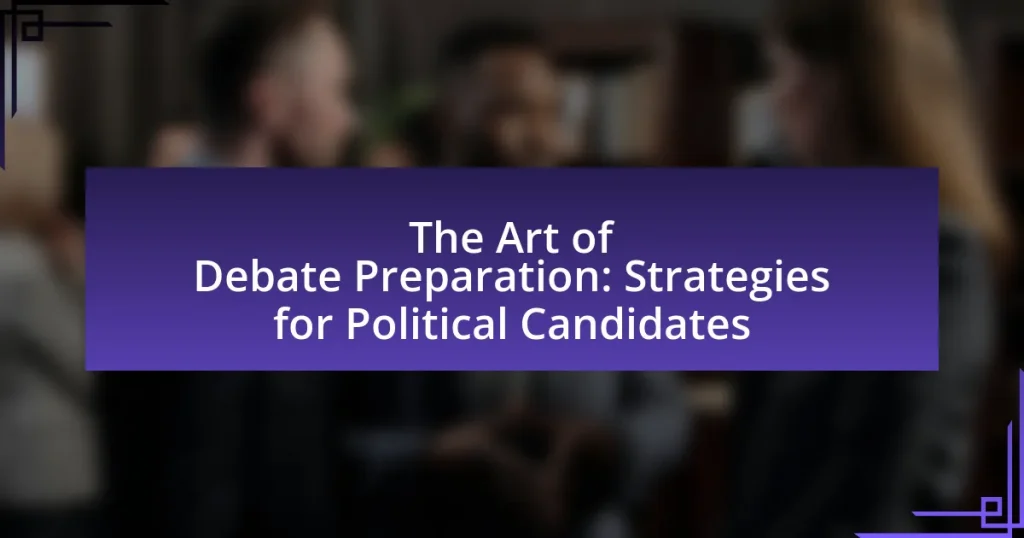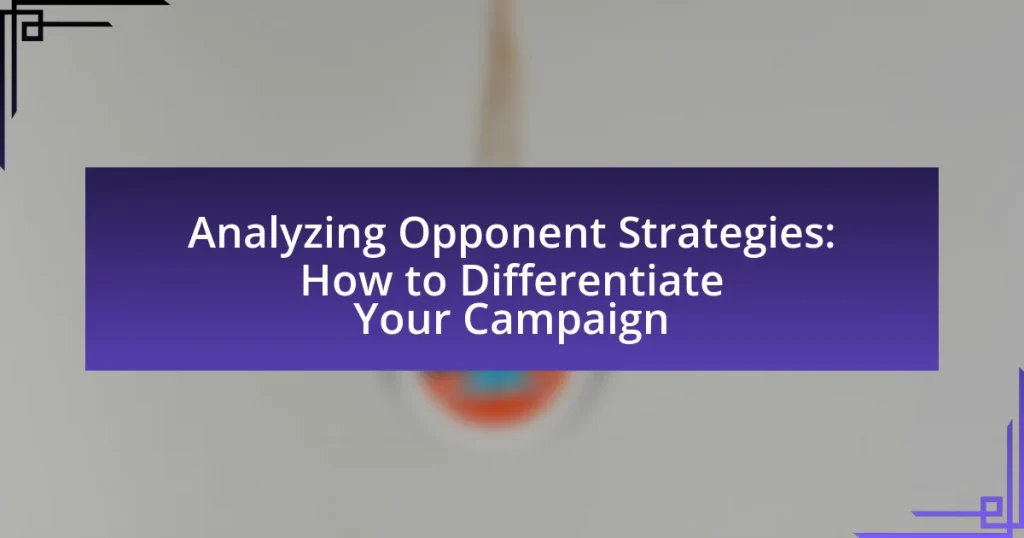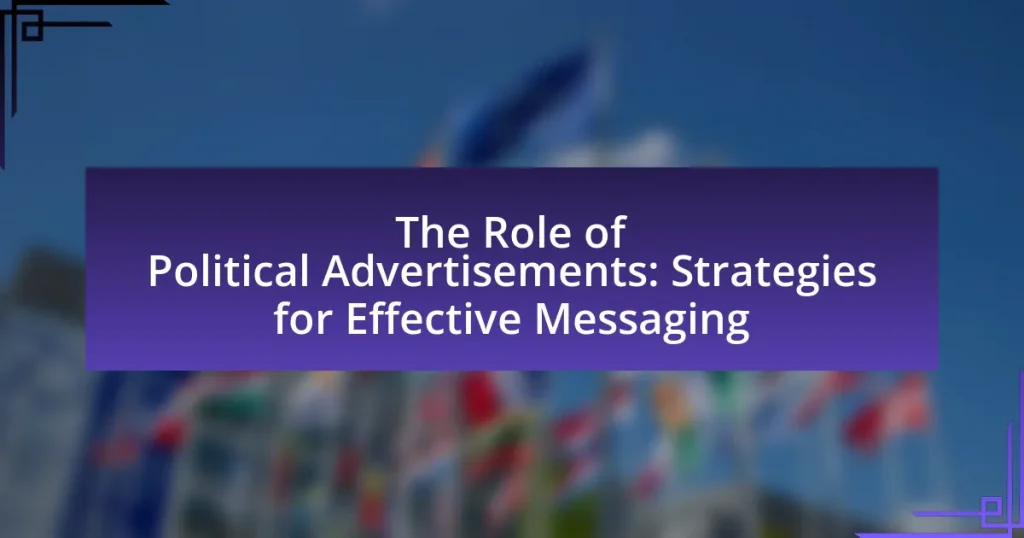The article focuses on the ethics of political campaigning, emphasizing the importance of honesty, transparency, respect for opponents, and accountability. It explores how these ethical principles influence campaign strategies and voter trust, particularly in the context of controversial tactics such as negative advertising and misinformation. The discussion highlights the implications of unethical campaigning on public perception, voter engagement, and the overall integrity of democratic processes. Additionally, it outlines practical steps candidates can take to navigate ethical dilemmas and maintain credibility in their campaigns.
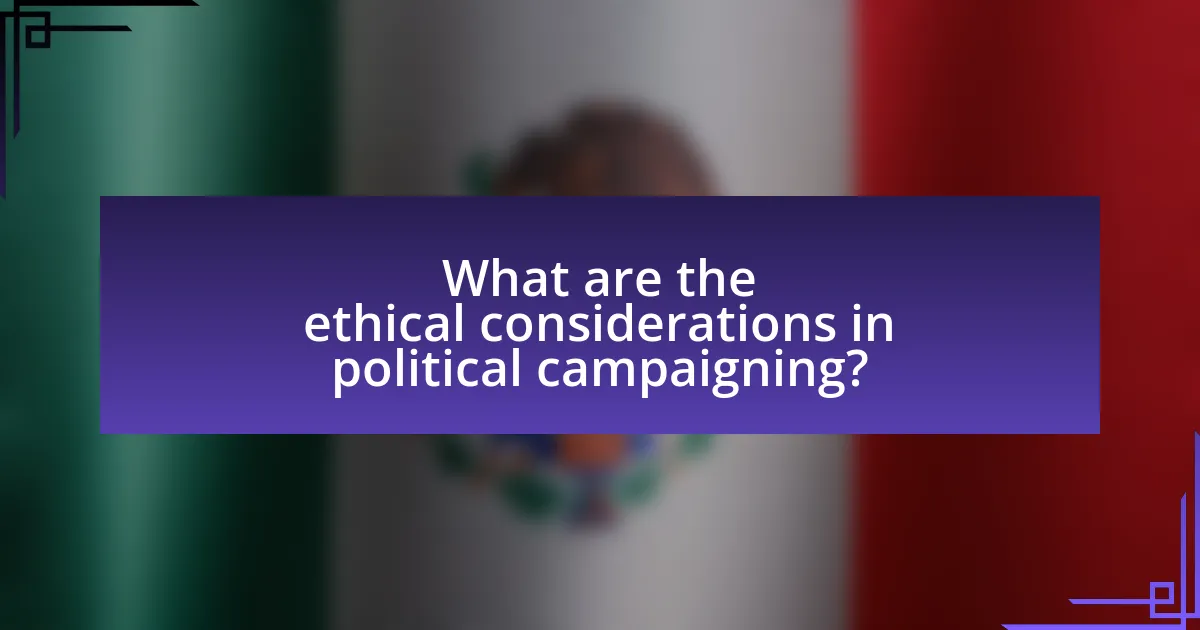
What are the ethical considerations in political campaigning?
Ethical considerations in political campaigning include honesty, transparency, respect for opponents, and the avoidance of manipulation. Honesty requires candidates to provide accurate information about their policies and backgrounds, as misleading voters can undermine democratic processes. Transparency involves disclosing funding sources and campaign strategies, which fosters trust among constituents. Respect for opponents is crucial to maintaining a civil discourse, while manipulation, such as using fear tactics or misinformation, can distort public perception and decision-making. These principles are essential for upholding the integrity of the electoral process and ensuring that voters can make informed choices.
How do ethical standards influence campaign strategies?
Ethical standards significantly influence campaign strategies by shaping the methods and messages candidates use to engage voters. Campaigns adhering to ethical standards tend to focus on transparency, honesty, and respect for opponents, which fosters trust among constituents. For instance, research indicates that campaigns that prioritize ethical communication can enhance voter engagement and loyalty, as seen in the 2008 U.S. presidential election, where candidates who maintained ethical discourse garnered higher approval ratings. Thus, ethical standards not only guide the conduct of campaigns but also impact their overall effectiveness and public perception.
What are the key ethical principles in political campaigning?
The key ethical principles in political campaigning include honesty, transparency, respect for opponents, and accountability. Honesty requires candidates to provide truthful information about themselves and their policies, avoiding misleading statements. Transparency involves openly sharing campaign funding sources and decision-making processes, which fosters trust among voters. Respect for opponents entails engaging in fair competition without resorting to personal attacks or defamatory tactics. Accountability means that candidates should take responsibility for their actions and the consequences of their campaign strategies. These principles are essential for maintaining the integrity of the electoral process and ensuring that voters can make informed decisions.
How do these principles apply to controversial strategies?
The principles of ethics in political campaigning apply to controversial strategies by emphasizing transparency, honesty, and respect for opponents. These principles guide campaigners to avoid misleading information and to engage in fair competition, even when employing contentious tactics. For instance, the American Political Science Association highlights that ethical campaigning fosters trust and accountability, which are crucial for democratic processes. By adhering to these ethical standards, campaigns can mitigate backlash and maintain public confidence, even when utilizing strategies that may provoke debate or dissent.
Why is transparency important in political campaigns?
Transparency is important in political campaigns because it fosters trust between candidates and voters. When candidates openly share their policies, funding sources, and decision-making processes, they enable voters to make informed choices. Research indicates that transparency can lead to higher voter engagement and participation; for instance, a study by the Pew Research Center found that 70% of voters believe that transparency in campaign financing is crucial for a fair electoral process. This trust is essential for the legitimacy of democratic systems, as it helps to reduce misinformation and promotes accountability among candidates.
What role does transparency play in voter trust?
Transparency is crucial in fostering voter trust as it ensures that electoral processes and candidate actions are open and accountable. When voters perceive transparency in campaign financing, decision-making, and communication, they are more likely to believe that the electoral system is fair and that candidates are honest. Research indicates that transparency can significantly enhance public confidence; for instance, a study by the Pew Research Center found that 70% of Americans believe that transparency in government leads to greater trust in political institutions. This correlation underscores the importance of transparent practices in building and maintaining voter trust.
How can campaigns ensure transparency in their operations?
Campaigns can ensure transparency in their operations by implementing clear communication strategies, regularly disclosing financial information, and engaging with stakeholders. Clear communication involves openly sharing campaign goals, strategies, and progress with the public, which builds trust. Regular financial disclosures, such as publishing detailed reports on donations and expenditures, allow voters to see how funds are being used, fostering accountability. Engaging with stakeholders, including voters and community organizations, through forums or social media enhances transparency by inviting feedback and addressing concerns. These practices are supported by research indicating that transparency in political campaigns correlates with increased voter trust and participation, as evidenced by studies from the Pew Research Center.
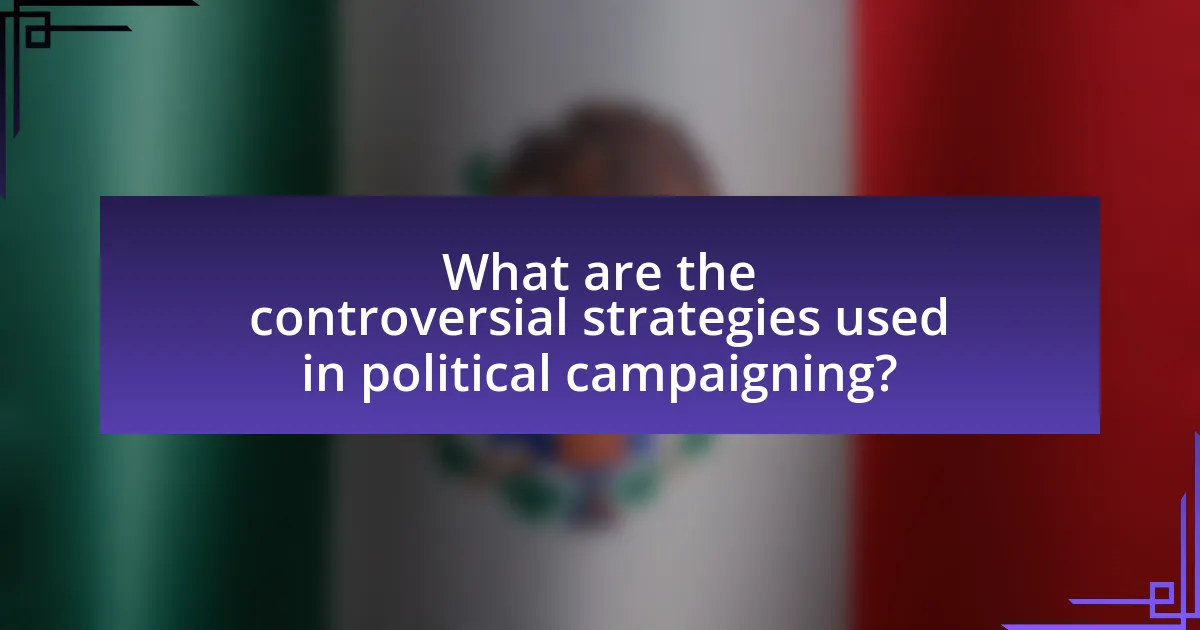
What are the controversial strategies used in political campaigning?
Controversial strategies used in political campaigning include negative advertising, misinformation, and voter suppression. Negative advertising, which involves attacking an opponent’s character or policies, has been shown to increase voter cynicism and decrease overall trust in the political process. Misinformation, particularly through social media, can mislead voters and distort public perception; for example, studies have indicated that false information spreads faster than factual content online. Voter suppression tactics, such as strict ID laws and purging voter rolls, disproportionately affect marginalized communities, raising ethical concerns about equal access to the electoral process. These strategies often spark debates about the integrity and fairness of democratic elections.
How do negative campaigning tactics affect public perception?
Negative campaigning tactics significantly influence public perception by fostering distrust and cynicism towards candidates. Research indicates that exposure to negative advertisements can lead to a decrease in overall voter turnout, as individuals become disillusioned with the political process. For instance, a study by the American Political Science Review found that negative campaigning can increase voter apathy, with 60% of respondents reporting feeling less motivated to vote after viewing negative ads. Furthermore, these tactics can create a polarized electorate, where individuals align more strongly with their preferred candidate while simultaneously developing negative feelings towards opponents. This dynamic can distort public discourse and hinder constructive political engagement.
What are the psychological impacts of negative ads on voters?
Negative ads significantly impact voters’ psychological states by inducing fear, anxiety, and distrust. Research indicates that exposure to negative political advertisements can lead to increased voter cynicism and lower political efficacy, as individuals may feel disillusioned about the political process. A study published in the Journal of Politics by Lau and Redlawsk (2006) found that negative campaigning can enhance the salience of issues, but it also tends to demobilize voters, particularly those who are less politically engaged. Furthermore, negative ads can create a hostile political environment, fostering polarization among voters, as evidenced by the work of Iyengar and Hahn (2009), which demonstrated that negative messaging can reinforce existing biases and deepen divisions within the electorate.
How can negative campaigning backfire on candidates?
Negative campaigning can backfire on candidates by alienating voters and damaging their own reputation. Research indicates that when candidates engage in negative tactics, they risk being perceived as untrustworthy or desperate, which can lead to decreased support. For example, a study by the American Political Science Review found that negative ads can lead to a backlash effect, where voters become more favorable towards the targeted opponent. Additionally, historical instances, such as the 2004 presidential election, demonstrate that excessive negativity can mobilize opposition and increase voter turnout against the negative campaigner.
What role does misinformation play in political campaigns?
Misinformation plays a significant role in political campaigns by shaping public perception and influencing voter behavior. It often spreads rapidly through social media and other platforms, leading to the dissemination of false narratives that can sway opinions and alter the electoral landscape. For instance, a study by the Pew Research Center found that 64% of Americans believe fabricated news stories cause confusion about the basic facts of current events, which can directly impact voter decisions. Furthermore, misinformation can undermine trust in legitimate sources of information, creating an environment where voters are more susceptible to manipulation.
How is misinformation spread during campaigns?
Misinformation is spread during campaigns primarily through social media platforms, where false narratives can rapidly gain traction. Research indicates that 70% of Americans encounter misinformation on social media, which often amplifies misleading information due to algorithms favoring sensational content. Additionally, political actors may intentionally disseminate false information to manipulate public perception, as seen in the 2016 U.S. presidential election, where targeted ads and fake news articles influenced voter behavior. The combination of rapid information sharing and the strategic use of misleading content creates an environment conducive to the spread of misinformation during political campaigns.
What are the consequences of misinformation for democracy?
Misinformation undermines democracy by eroding public trust in institutions and distorting the electoral process. When citizens are exposed to false information, they may make decisions based on inaccurate perceptions, leading to the election of candidates who do not represent their true interests. Research from the Pew Research Center indicates that 64% of Americans believe that misinformation has a significant impact on public opinion and political polarization. This polarization can result in increased division among the electorate, making it difficult to achieve consensus on critical issues. Furthermore, misinformation can suppress voter turnout by creating confusion about voting procedures or candidate positions, ultimately weakening democratic participation.
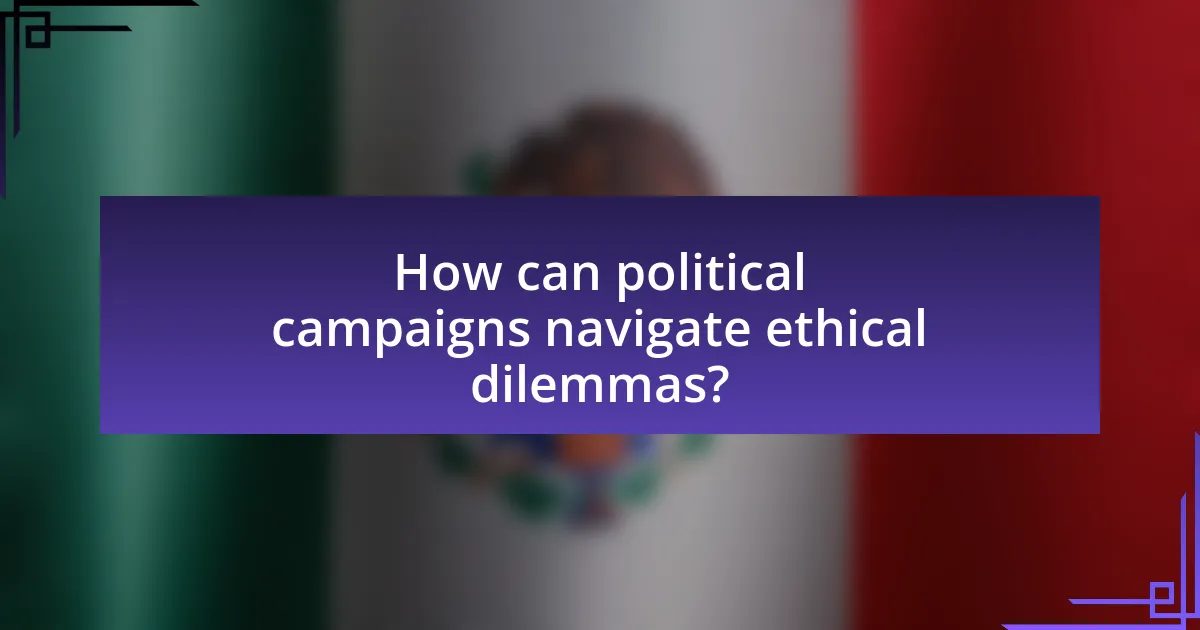
How can political campaigns navigate ethical dilemmas?
Political campaigns can navigate ethical dilemmas by establishing clear ethical guidelines and fostering transparency in their operations. By creating a code of ethics that outlines acceptable practices, campaigns can ensure that all team members understand the standards expected of them. Transparency, such as openly disclosing funding sources and campaign strategies, builds trust with voters and mitigates potential backlash from unethical practices. Research indicates that campaigns adhering to ethical standards not only enhance their credibility but also improve voter engagement, as seen in the 2020 U.S. presidential election where candidates who prioritized ethical communication gained higher public trust.
What best practices can campaigns adopt to maintain ethical integrity?
Campaigns can maintain ethical integrity by adhering to transparency, honesty, and accountability in their messaging and operations. Transparency involves openly disclosing funding sources and campaign strategies, which fosters trust among voters. Honesty requires campaigns to provide accurate information and avoid misleading statements, as evidenced by the Federal Election Commission’s regulations that mandate truthful advertising. Accountability can be achieved through mechanisms that allow for public scrutiny and feedback, ensuring that campaigns are answerable for their actions. These practices collectively contribute to a more ethical political environment and enhance public confidence in the electoral process.
How can campaigns balance aggressive strategies with ethical standards?
Campaigns can balance aggressive strategies with ethical standards by implementing transparent communication and adhering to established ethical guidelines. Transparency ensures that voters are informed about the campaign’s intentions and methods, fostering trust. Adhering to ethical guidelines, such as those set by the American Association of Political Consultants, helps campaigns avoid misleading information and respect opponents. Research indicates that campaigns that maintain ethical standards while employing aggressive tactics can enhance their credibility and voter support, as seen in the 2020 U.S. presidential election where candidates who focused on integrity gained favor among undecided voters.
What frameworks exist for ethical decision-making in campaigns?
Several frameworks exist for ethical decision-making in campaigns, including the Utilitarian Approach, the Rights Approach, the Fairness or Justice Approach, and the Common Good Approach. The Utilitarian Approach focuses on the outcomes of actions, aiming to maximize overall happiness and minimize harm. The Rights Approach emphasizes the protection of individual rights and freedoms, ensuring that actions do not infringe upon these rights. The Fairness or Justice Approach advocates for equitable treatment and fairness in decision-making processes, while the Common Good Approach stresses the importance of community welfare and the collective good. These frameworks provide structured methodologies for evaluating ethical dilemmas in political campaigning, guiding candidates and their teams in making responsible choices that align with ethical standards.
What are the implications of unethical campaigning on society?
Unethical campaigning undermines democratic processes and erodes public trust in political institutions. When candidates engage in misleading tactics, such as spreading false information or exploiting emotional appeals, they distort the electorate’s ability to make informed decisions. Research indicates that exposure to misinformation can lead to increased polarization and cynicism among voters, as evidenced by a study published in the journal “Political Communication,” which found that misleading campaign messages significantly influenced voter perceptions and behaviors. Furthermore, unethical practices can marginalize legitimate discourse, creating an environment where only sensationalism prevails, ultimately harming the quality of democratic engagement and civic responsibility.
How does unethical campaigning affect voter engagement?
Unethical campaigning negatively impacts voter engagement by fostering distrust and disillusionment among the electorate. When candidates employ deceptive tactics, such as misinformation or manipulation, it undermines the integrity of the electoral process, leading to voter apathy. Research indicates that a significant portion of voters, approximately 70%, express skepticism towards candidates who engage in unethical practices, which correlates with lower voter turnout rates. This decline in engagement can be attributed to the perception that the political system is rigged or untrustworthy, ultimately discouraging participation in future elections.
What long-term effects can unethical strategies have on political culture?
Unethical strategies can lead to a significant erosion of trust in political institutions and processes. When political actors engage in deceitful practices, such as misinformation or manipulation, it undermines public confidence in the integrity of elections and governance. This decline in trust can result in lower voter turnout, as citizens become disillusioned and disengaged from the political system. Historical examples, such as the Watergate scandal in the 1970s, illustrate how unethical behavior can lead to widespread skepticism about political leaders and institutions, ultimately altering the political landscape for generations. Additionally, a culture that normalizes unethical strategies may foster a competitive environment where integrity is sacrificed for short-term gains, perpetuating a cycle of corruption and cynicism within the political culture.
What practical steps can candidates take to ensure ethical campaigning?
Candidates can ensure ethical campaigning by adhering to transparency, honesty, and respect for opponents. They should disclose funding sources and avoid misleading information, as transparency fosters trust and accountability. Additionally, candidates must fact-check their statements to prevent the spread of falsehoods, which can damage public trust and the integrity of the electoral process. Engaging in respectful discourse, rather than personal attacks, promotes a healthier political environment and encourages constructive dialogue among voters. Following these steps aligns with ethical standards and enhances the credibility of the campaign.
